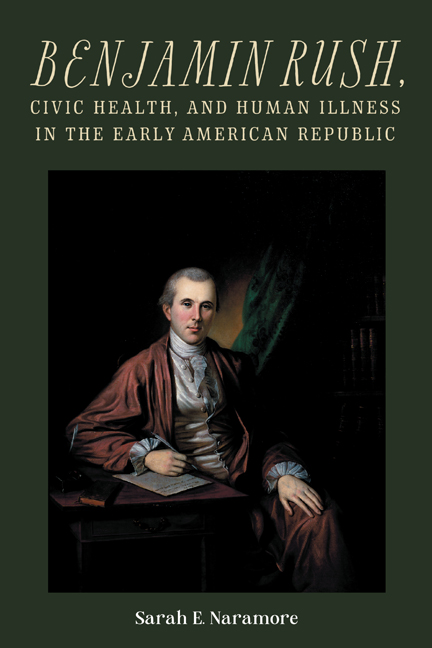2 - An American Physician
Published online by Cambridge University Press: 10 January 2024
Summary
In 1785, Scottish physician and professor William Cullen wrote to his former pupil Benjamin Rush praising their continued friendship—and that of their respective universities—after the disruption of revolution and independence. Cullen noted, however, that he “must expect that the spirited exertions which have acquired your independence in politics will acquire the same in physic. The Medical School of Philadelphia as the chief of a great Empire must flourish more and more.” In other words, Cullen expected the medical men of the United States to strike out on their own and promote their research and profession independent of British concerns. Men like Rush wanted to make a name for themselves and their country, something Cullen understood. But it was more than just ambition that animated American science and medicine at the end of the eighteenth century. According to prevailing eighteenth-century medical theory, nations had peculiar interests, climates, characters, and therefore illnesses, which required experienced local and national physicians to interpret.
Cullen assumed medical and intellectual independence followed political independence. Just as the Scottish medical establishment worked for and within the structures of the state, so too, he thought, would the American. The two countries might participate as independent and equal members of the international scientific community and “republic of letters.” Rush certainly tried to live up to that prediction through his extensive publishing, international correspondence, and unfailing self-identification as a republican. Nearly a decade later, on May 31, 1793, New York physician Valentine Seaman (1770–1817) addressed a letter to Rush referring to him as a “Republican in Medicine.” Seaman further noted that with respect to the progress of medical publishing in New York, Rush would no doubt “be pleased with the … freedom of Thought [sic] & truly republican Spirit of enquiry, upon a subject which perhaps has been too much fettered in the tyrannical trammels of great Authorities.”
What was this “republican spirit” that Seaman referred to? Both letterwriters used political language that leaches into medical discourse without serious concern or comment. Rather than fear the politization of medicine as we might now, Cullen, Seaman, and Rush expected independence and republicanism to alter their profession in the United States.
- Type
- Chapter
- Information
- Publisher: Boydell & BrewerPrint publication year: 2023

